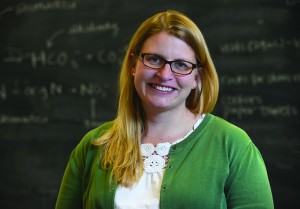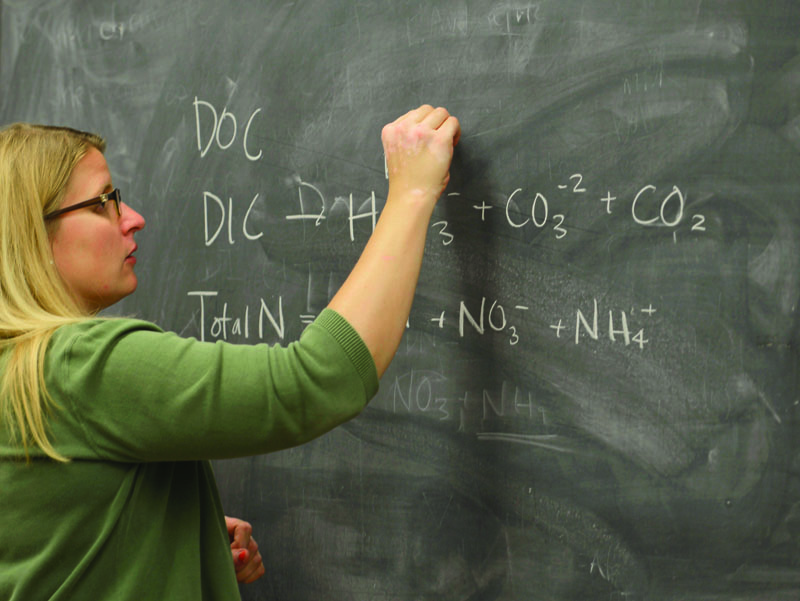Despite the calls from politicians and corporations for more women to pursue science, technology, engineering, and mathematic (STEM) fields, there remains a gender gap: Women and other minority groups are consistently under-represented in many areas of science and engineering. According to the National Science Foundation, women received 57 percent of all bachelor’s degrees in 2012 and 50 percent of science and engineering degrees. However, women’s participation in various fields differs greatly, with women earning over half the bachelor’s degrees in biological sciences (59 percent) and far fewer in fields such as physics (19 percent) and earth sciences (39 percent). Similar trends exist when looking at the percentage of women earning doctoral degrees in science and engineering and when examining the labor market: Although women make up 47 percent of the U.S. workforce, they are underrepresented in many STEM occupations (e.g., women represent only 12 percent of civil engineers and 28 percent of environmental scientists). This lack of diversity has implications for innovation, limiting the human potential applied toward science and sustainability. Given that many of the most urgent and important challenges facing society are scientific (e.g., energy, climate change, water availability, disease, and natural resource forecasting), this lack of diversity must be addressed.

Barnes, an assistant professor in the Environmental Program, is a principal investigator on a $1.7 million National Science Foundation grant titled “Improving the recruitment and persistence of women in the geosciences: Exploring deliberate mentoring approaches aimed at undergraduate students.” The initiative is a collaborative, multi-campus project that addresses two issues in STEM: underrepresentation of women in the earth sciences and shortcomings of existing studies addressing effective strategies for mentoring.
Gender diversity in sciences is a problem that begins at the earliest stages of schooling —with implicit stereotypes reinforced by both male and female teachers. Once in college, this bias is reinforced by the simple fact that many STEM departments have only one or two female faculty. (Note: Colorado College’s Physics and Chemistry departments are an exception to this pattern.) This lack of diversity—and thus availability of role models—leads female students to feel disconnected from their chosen field of study. This sense of not belonging is identified as one of the largest barriers to the advancement and success of female students. In addition to the feeling of isolation, female scientists at all career stages continue to face a number of biases, which collectively add to the gender gap. A number of recent studies illustrate these biases. For example:
In a 2012 study, researchers presented identical applications for a student lab manager position to faculty and simply changed the name (and thereby gender) of the applicant. Faculty determined that the male applicants were more competent, deserving of a higher salary and more worthy of mentorship than their female counterparts.
In 2014, researchers reported that managers, looking to hire someone to do math, were two times more likely to choose the man; this ratio only improved slightly when the manager was presented performance data, suggesting that not only is there bias in hiring but also that managers are often not hiring the best person for the job.
A 2014 study revealed that female faculty routinely receive worse evaluations than male faculty. An analysis of comments on the popular website Rate My Professor shows that female faculty were often described as “bossy and annoying, beautiful or ugly” while male faculty were described as “brilliant, awesome, and knowledgeable.” These reviews are critical to faculty advancement, especially at teaching-oriented schools such as CC, and thus these student biases impact faculty retention.
There are numerous organizations working to reduce these biases and to increase the number of female scientists. One such organization is the Earth Science Women’s Network (eswnonline.org), a nonprofit group dedicated to supporting women early in their scientific careers. Recently, a number of us were awarded a grant from the National Science Foundation to increase the recruitment and retention of female undergraduates in geosciences. To do this we are creating multiple mentoring networks for undergraduate STEM women, including regional and national peer networks, as well as in-person mentoring from graduate students, postdoctoral researchers, and faculty. Our hope is that by connecting female students to our networks, mentoring them in the lab and field, and advocating for them as strongly as we do our male students that we can reduce the “leaky pipeline.” In addition, we hope to leverage our program to train female and male graduate students, postdocs, and faculty members to recognize these biases and work to overcome them.
